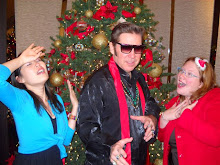Friday, April 20, 2007
New Commentary and Text Below!
Click on the video for "Distractions, Distractions". Complete text below. Thanks for your comments--I read all of them!
Distractions, Distractions
Do you let yourself get distracted from life? I’m not talking about the unexpected interruptions that occur during the day, but the conscious
decisions we make that take us away from living life to it’s fullest.
Many people choose to distract themselves with TV. TV is not evil, but too often the time spent watching TV expands, so that it consumes
valuable time that could be used pursuing life’s goals. The Internet is a big distraction for me—I can spend countless hours dredging the depths of the web in search of useless information. Hours spent watching TV or surfing the web could be utilized learning a new skill or language,
maybe even getting some exercise. Better yet, how about spending this time in good conversation with family or friends? Imagine that—actually relating to other human beings. Maybe volunteering for a worthy charity would be a good idea.
Can’t shake that cell phone? I’m amazed at the number of commuters who are glued to this little hand machine—whether talking incessantly, or tapping away innumerable text messages. MP3 players now make it possible to tune out the rest of the world for hours on end. While busy with cell phones and MP3 players, the world passes us by—we miss things, we don’t observe our surroundings, and we don’t communicate with people standing six inches from us. Worst of all, we don’t take time to simply sit and think.
TV, the Internet, cell phones and MP3 players are useful things—unless they take over your world. So examine your day and make sure you’re not living a life of distraction.
Key Words
Conscious-n-our mental awareness of things.
Dredge-v-to dig up.
Shake-v-to let go of something.
Incessantly-adj-non-stop, without ceasing.
Innumerable-adj-many, a very high number.
decisions we make that take us away from living life to it’s fullest.
Many people choose to distract themselves with TV. TV is not evil, but too often the time spent watching TV expands, so that it consumes
valuable time that could be used pursuing life’s goals. The Internet is a big distraction for me—I can spend countless hours dredging the depths of the web in search of useless information. Hours spent watching TV or surfing the web could be utilized learning a new skill or language,
maybe even getting some exercise. Better yet, how about spending this time in good conversation with family or friends? Imagine that—actually relating to other human beings. Maybe volunteering for a worthy charity would be a good idea.
Can’t shake that cell phone? I’m amazed at the number of commuters who are glued to this little hand machine—whether talking incessantly, or tapping away innumerable text messages. MP3 players now make it possible to tune out the rest of the world for hours on end. While busy with cell phones and MP3 players, the world passes us by—we miss things, we don’t observe our surroundings, and we don’t communicate with people standing six inches from us. Worst of all, we don’t take time to simply sit and think.
TV, the Internet, cell phones and MP3 players are useful things—unless they take over your world. So examine your day and make sure you’re not living a life of distraction.
Key Words
Conscious-n-our mental awareness of things.
Dredge-v-to dig up.
Shake-v-to let go of something.
Incessantly-adj-non-stop, without ceasing.
Innumerable-adj-many, a very high number.
Monday, April 9, 2007
Commentary and text below!
Click on for the new video commentary, Keep It Simple Sweety. Below it is the text. MP3 download is not available now, but I'll figure it out later. So, enjoy the video---and you may want to copy/print the text, or read along. Sound and video quality will improve, as this is a learning process. Next new video will be April 20th.
Text for Keep It Simple Sweety Commentary
Keep It Simple Sweety
One of my pet peeves is the long-winded speaker. It drives me crazy to sit and listen to someone who is giving a speech or presentation that drones on and on. Too few orators have been trained in the art of being concise. Arguably the two most famous speeches in American history are Abraham Lincoln’s Gettysburg Address and Martin Luther King’s I Have a Dream speech. Lincoln’s offering was less than five minutes, King’s under eight minutes. Keep this in mind the next time you have to give a speech or presentation. What do I have to say that is more important, or more moving than these two speeches? Their brevity is actually what packs the power in both speeches—there isn’t a wasted word. Granted, there are times when we must spend a longer time on a presentation with significant detail. In such cases, remember that studies have shown that human beings have an attention span of twenty minutes. After twenty minutes the audience tends to fade out, in which case you need to shift gears to provide a new fulcrum of attention.
It’s also important to keep conciseness in mind in casual conversation and the written word. I’ve received emails that are so long I don’t even read them! How many times has someone started a conversation with you and gone on and on till you couldn’t wait to free yourself from this person? Don’t bore your audience with repetition or useless information—you’ll lose their interest and they may end up resenting you. The shorter, the better in all communication—you’ll be amazed at how effective you can be.
(Note: The KISS method is an acronym for Keep It Simple Stupid. I don’t like the use of Stupid here, so I replaced it with Sweety. I’m sure you’ll agree that’s much nicer.)
Key Words;
Pet peeve-idiom-a favorite thing to complain about; something that really bothers you.
Drones-v-to make a continuous, low, dull or monotonous tone or sound.
Concise-adj-expressing much in few words, clear, succinct.
Brevity-adj-briefness of duration, concise expression, short.
Fulcrum-n-the point or support on which a lever pivots, supports a change in direction.
Resent-v-to feel angry or bitter about something or someone.
One of my pet peeves is the long-winded speaker. It drives me crazy to sit and listen to someone who is giving a speech or presentation that drones on and on. Too few orators have been trained in the art of being concise. Arguably the two most famous speeches in American history are Abraham Lincoln’s Gettysburg Address and Martin Luther King’s I Have a Dream speech. Lincoln’s offering was less than five minutes, King’s under eight minutes. Keep this in mind the next time you have to give a speech or presentation. What do I have to say that is more important, or more moving than these two speeches? Their brevity is actually what packs the power in both speeches—there isn’t a wasted word. Granted, there are times when we must spend a longer time on a presentation with significant detail. In such cases, remember that studies have shown that human beings have an attention span of twenty minutes. After twenty minutes the audience tends to fade out, in which case you need to shift gears to provide a new fulcrum of attention.
It’s also important to keep conciseness in mind in casual conversation and the written word. I’ve received emails that are so long I don’t even read them! How many times has someone started a conversation with you and gone on and on till you couldn’t wait to free yourself from this person? Don’t bore your audience with repetition or useless information—you’ll lose their interest and they may end up resenting you. The shorter, the better in all communication—you’ll be amazed at how effective you can be.
(Note: The KISS method is an acronym for Keep It Simple Stupid. I don’t like the use of Stupid here, so I replaced it with Sweety. I’m sure you’ll agree that’s much nicer.)
Key Words;
Pet peeve-idiom-a favorite thing to complain about; something that really bothers you.
Drones-v-to make a continuous, low, dull or monotonous tone or sound.
Concise-adj-expressing much in few words, clear, succinct.
Brevity-adj-briefness of duration, concise expression, short.
Fulcrum-n-the point or support on which a lever pivots, supports a change in direction.
Resent-v-to feel angry or bitter about something or someone.
Subscribe to:
Comments (Atom)




